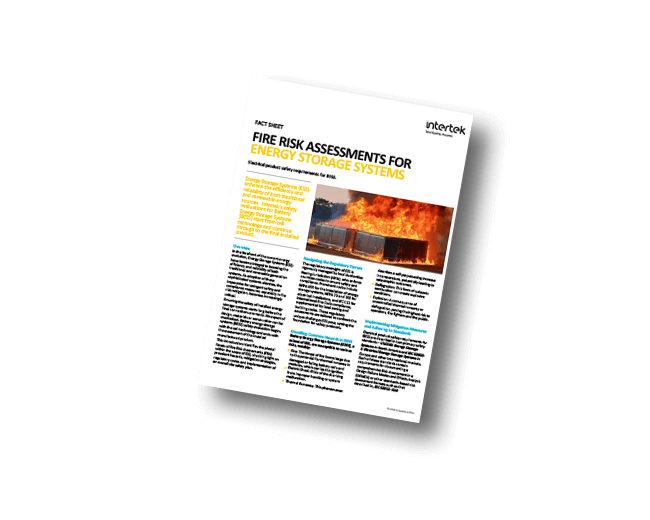Fire Risk Assessments in Energy Storage Systems
Energy Storage Systems (ESS) play a crucial role in enhancing the efficiency and reliability of both traditional and renewable energy sources. As the adoption of these systems increases, ensuring their safety through stringent fire risk mitigation measures becomes paramount.
Intertek’s safety evaluations for Battery Energy Storage Systems (BESS) start from cell technology and continue through to the final installed product.
Intertek Helps Navigate Regulatory Requirements
Local Authorities Having Jurisdiction (AHJs) enforce numerous codes to ensure ESS safety, including NFPA 855, NFPA 70, NFPA 70E, and IFC C12. These regulations address the unique challenges posed by ESS, laying the groundwork for robust safety protocols.
Common Hazards in BESS
BESS face several risks, including:
- Fire: Potential ignition from thermal runaway in battery cells.
- Electric Shock: Risks from improper handling or malfunctions.
- Thermal Runaway: Self-perpetuating temperature increases leading to catastrophic outcomes.
- Deflagration: Subsonic combustion creating explosive conditions.
- Explosion: High-risk events resulting from uncontrolled thermal runaway or deflagration.
Mitigation Measures and Standards
BESS safety standards include UL9540 in North America and IEC 62933-1 internationally. These standards require comprehensive risk assessments, often documented in a Design Failure Modes and Effects Analysis (DFMEA). Fire Risk Assessments (FRA) specifically address fire hazards, with NFPA 551 guiding their evaluation. UL9540A outlines test methods for evaluating thermal runaway fire propagation in BESS, essential for gaining installation approval.
Energy Storage Systems (ESS) enhance the efficiency and reliability of energy sources. Intertek’s safety evaluations for Battery Energy Storage Systems start from cell technology and continue through to the final installed product.
Intertek ATIC Services
Intertek’s Assurance, Testing, Inspection, and Certification (ATIC) Services assist stakeholders in mastering ESS safety and compliance:
- Regulatory Scans: Identifying requirements for ESS installations.
- Product Design Consulting: Overcoming compliance gaps from risk assessment to design.
- Product Testing: Ensuring safety and performance through rigorous testing.
- Certification Assessments: Validating compliance for various markets.
- Site Assessments and Consultancy: Expert guidance on installation, operation, and maintenance.
ESS are vital for advancing sustainable energy by balancing renewable sources and enhancing grid stability. By adhering to safety codes, mitigating hazards, and employing rigorous standards, manufacturers can ensure the efficiency and security of their ESS. Intertek’s ATIC Services offer comprehensive support, ensuring innovative and safe energy storage solutions.
Knowledge Center
Top-10 FAQs about the UN 38.3 8th Edition
Techniques & Methods of Li-Ion Battery Failure Analysis: Webinar | White Paper
IEC 62133 and the Lithium-ion Battery Compliance Roadmap - webinar recording
UN 38.3 and the Transportation of Lithium Batteries: A Webinar Series
Battery Energy Storage Systems (BESS) for On- and Off-Electric Grid Applications - white paper
Energy Storage Systems: Product Listing & Certification to ANSI/CAN/UL 9540
Top-8 FAQs of Failure Analysis
Hoverboards, UL 2272 and You! - webinar recording
Consulting, Registration, and Recycling Services for Product Packaging and Batteries

